'Farrakhan is right, Jewish interference is wrong'
By Ashahed M. Muhammad -Asst. Editor- | Last updated: Jun 18, 2013 - 6:59:50 AMWhat's your opinion on this article?
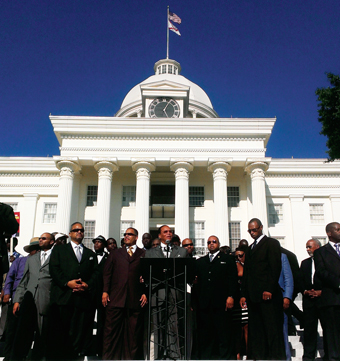
Minister Farrakhan speaks on the steps of the Alabama state capitol in Montgomery June 14. Photos: Ashahed M. Muhammad
|
Despite their hollow protests, and repeating the thoroughly discredited, yet oft-repeated specious claims of Minister Farrakhan’s “anti-Semitism,” over the past year and a half, nothing has stopped him in Alabama. He has delivered major messages to large and enthusiastic audiences at the request of students, religious leaders and political leaders in the state.
Back in April 2012, during the Minister’s tour of several historically Black colleges, the Birmingham Jewish Federation tried to prevent him from speaking at Alabama A&M in Huntsville by working through the Huntsville Jewish Federation. They failed. The BJF also meddled in the affairs of Black people when they attempted to create problems surrounding the Minister’s appearance at Tuskegee University in March. They contacted school trustees and others, and the regional leader of the Anti-Defamation League of B’nai B’rith wrote a letter to the president of Tuskegee University expressing displeasure.
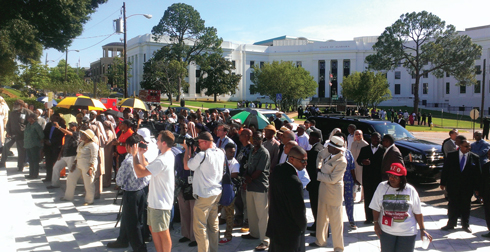
Full media contingents showed up at every caravan stop and so did concerned members of the community.
|
This time, consistent with the arrogant and paternalistic attitude of Jewish leaders when it comes to dealing with Black people, BJF executive director Richard Friedman wrote an Op-Ed appearing in the Wall Street Journal expressing his “discomfort” regarding the welcome Min. Farrakhan has received in Alabama and growing influence.
The Minister forthrightly addressed these attacks during comments in Selma and Montgomery, calling out the hypocrisy as Mr. Friedman labeled him a hater but the real haters enslaved, exploited and killed Black people in Alabama.
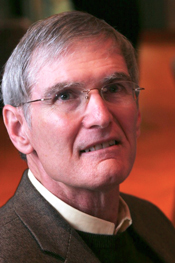
Richard Friedman, Executive Director of the Birmingham Jewish Federation
|
“Those are the real haters Mr. Friedman that you should be talking about. They are your brothers who worked us on the plantation from ‘can’t see morning to can’t see night.’ That’s why you are rich and powerful because you worked us,” said Min. Farrakhan. “So don’t talk to me about hate! Go look in the mirror because you hate the fact that my people are growing to love me in spite of you wanting them to hate me!”
“You’ve got a hell of a nerve telling me where I can come,” said the Minister. “We’ve paid the price! Our blood soaks the soil of Alabama! We’ve drowned in the rivers and the lakes and hung on the trees, so don’t you tell us you own this! Jesus said God will take the kingdom from you and he will give it to another and he didn’t just say another, he said another nation that would bring in the fruits thereof.”
Voices from Alabama
Kenneth Earl Williams Jr., 20, from Montgomery stood in the grass listening very carefully just feet from a stone monument erected in 1976 to honor first U.S. President George Washington. He felt the Minister’s words were good for him personally and his message should be spread throughout the Black community.
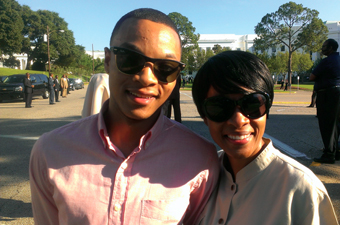
Kenneth Earl Williams Jr., 20, listened to the Minister’s message with his mother Margo Williams, 43, during the final caravan stop in Montgomery. “We’re going forward — we’re not going back,” she said.
|
His mother Margo Williams, 43, said though America elected its first Black president, things have gotten worse.
“I felt like it was important for us to come out and hear what he (Min. Farrakhan) was saying and it is sad. It breaks my heart. There’s so much that I did not see, but there is so much that I have seen and so many doors have been opened for me educationally and as a professional. And they are trying to take us back with the removal of Section 5,” said Ms. Williams. “It’s a sad day not just for the state of Alabama or the city of Montgomery, it’s a sad day in the United States of America where we are headed. To me it’s just very important that we stand together. We are making some positive strides and that’s what we want to continue to do. We’re going forward—we’re not going back,” she added.
Twenty-two-year-old senior Gabriel Smith, a history major at Tuskegee University, said the fight for the right to vote is “too important to ignore.”
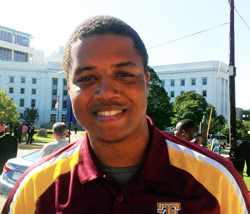
22-year-old Tuskegee University senior Gabriel Smith.
|
Larry Pollard, 61, was present at the 1995 Million Man March in Washington, D.C. He supports the Minister and those engaged in the battle to protect the rights of Black people. The controversy that developed around the Minister’s appearance actually caused Mr. Pollard to come out to the rally.
“He (Farrakhan) represents Black people and the Black man. He stands up for our people and we all should unite,” he said.
“I’m here because Section 5 is the cornerstone and if it gets taken away, it’s going to gut voting rights. I’m not a fool, I live in Alabama. I vote. I’ve campaigned. I’ve registered voters. I’ve done this since I was a teenager, so I know it was a struggle,” said Barbara Pitts, an Auburn resident who marched and went to jail in 1965 as a high school student with Tuskegee University student Samuel Younge, a civil rights martyr. “It will set us back. We don’t need to be set back and we need to fight!” she added.
While outright denial and brutal intimidation were tools yesterday, today threats are not overt but consist of conservative forces trying to limit or take away Black voting rights through legal maneuvers and technicalities, said advocates who want Justice Dept. approval of changes by certain states to remain intact under Section 5 of the Voting Rights Act.
At Final Call presstime, the U.S. Supreme Court was considering whether enough progress had been made to lift the requirements.
As noted by the National Constitution Center, the historic Supreme Court decision heralds back to February arguments in the case of Shelby County v. Holder. “Shelby County, Alabama, filed suit in district court, claiming that Section 5 and Section 4(b) of the Voting Rights Act are unconstitutional. Two courts then ruled that those sections were constitutional,” the center noted.
“Section 5 prohibits selected districts and states from changing their election laws and procedures without getting official approval from the federal government. Section 4(b) defines the districts as having had a voting test in place as of November 1, 1964 with less than 50 percent turnout for the 1964 presidential election,” the center added. The high court had at least six major cases to announce with just three announcement days left in June at Final Call presstime June 17.
“During those February hearings, the conservative majority of the Supreme Court didn’t appear to be swayed by arguments by the Obama administration to keep the ‘preclearance’ requirement in Section 5 of the law. That provision requires all or parts of 16 states, including virtually the entire Southern region of the United States, to get Justice Department approval before changing election districts, voting rules, and polling locations,” the National Constitution Center said.
INSIDE STORIES AND REVIEWS
-
-
About Harriett ... and the Negro Hollywood Road Show
By Rabiah Muhammad, Guest Columnist » Full Story -
Skepticism greets Jay-Z, NFL talk of inspiring change
By Bryan 18X Crawford and Richard B. Muhammad The Final Call Newspaper @TheFinalCall » Full Story -
The painful problem of Black girls and suicide
By Charlene Muhammad -National Correspondent- » Full Story -
Exploitation of Innocence - Report: Perceptions, policies hurting Black girls
By Charlene Muhammad -National Correspondent- » Full Story -
Big Ballin: Big ideas fuel a father’s Big Baller Brand and brash business sense
By Bryan Crawford -Contributing Writer- » Full Story






 Click Here Stay Connected!
Click Here Stay Connected!








